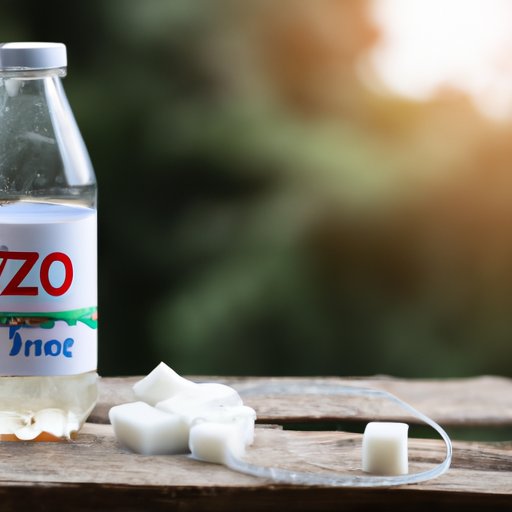Introduction
Zero sugar drinks are a popular alternative to traditional sugary beverages. They offer a low-calorie option that can help reduce sugar intake and provide some additional health benefits. But are they really healthier than regular sodas or juices? This article will explore the pros and cons of zero sugar drinks, examining their impact on weight management, blood sugar levels, heart health, and more.
Examining the Pros and Cons of Zero Sugar Drinks
Zero sugar drinks come in a variety of flavors and can be made with natural or artificial sweeteners. While they may contain fewer calories than regular soda or juice, there are both benefits and potential risks associated with drinking them.
Benefits of Zero Sugar Drinks
One of the primary benefits of zero sugar drinks is that they can help reduce overall sugar intake. According to the World Health Organization (WHO), added sugars should make up no more than 10% of an individual’s daily calorie intake. Zero sugar drinks can help people meet this goal without sacrificing taste.
In addition, zero sugar drinks often contain fewer calories than their sugary counterparts. This can be beneficial for those trying to manage their weight, as consuming fewer calories can lead to reduced body fat over time. Furthermore, some studies have shown that artificial sweeteners used in zero sugar drinks can help curb cravings for sugary snacks.
Potential Dangers of Zero Sugar Drinks
While zero sugar drinks can have some benefits, there are also potential risks associated with drinking them. One concern is that artificial sweeteners used in zero sugar drinks can cause gastrointestinal issues, such as bloating, gas, and diarrhea. In addition, some people may experience headaches or other symptoms from caffeine sensitivity.
In addition, there is some evidence that artificial sweeteners may have an effect on blood sugar levels. A study published in the journal Diabetes Care found that participants who consumed artificially sweetened beverages had higher levels of fasting glucose than those who did not. This could potentially increase the risk of developing type 2 diabetes.
Exploring the Health Impacts of Zero Sugar Drinks
When deciding whether or not to include zero sugar drinks in your diet, it’s important to consider how they may affect your health. Let’s take a closer look at the potential impacts on weight management, blood sugar levels, and heart health.
Impact on Weight Management
As mentioned earlier, zero sugar drinks can be beneficial for those trying to manage their weight. However, it’s important to note that simply replacing sugary beverages with zero sugar alternatives won’t necessarily lead to weight loss. To see results, you need to make other changes to your diet and lifestyle as well.
Impact on Blood Sugar Levels
As mentioned previously, studies have shown that artificial sweeteners used in zero sugar drinks can have an effect on blood sugar levels. However, the exact mechanism is still not fully understood. Some experts believe that artificial sweeteners may interfere with the body’s ability to regulate blood sugar, while others suggest that they may affect gut bacteria in a way that leads to increased glucose levels.
Impact on Heart Health
There is also some evidence that zero sugar drinks may have an effect on heart health. A study published in the Journal of the American College of Cardiology found that participants who drank one or more servings of artificially sweetened beverages per day had a higher risk of stroke and coronary heart disease compared to those who did not consume any. However, further research is needed to understand the full impact of zero sugar drinks on heart health.

Investigating the Potential Side Effects of Zero Sugar Drinks
In addition to the potential health risks outlined above, there are some other potential side effects associated with zero sugar drinks. These include:
Gastrointestinal Issues
As mentioned earlier, artificial sweeteners used in zero sugar drinks can cause gastrointestinal issues, such as bloating, gas, and diarrhea. While these symptoms are generally mild, they can still be uncomfortable. If you experience any of these symptoms after drinking zero sugar drinks, it’s best to reduce or eliminate them from your diet.
Caffeine Sensitivity
Many zero sugar drinks contain caffeine, which can cause headaches or other symptoms in people who are sensitive to it. If you’re prone to caffeine-induced headaches or other symptoms, it’s best to avoid these drinks or limit your intake.
Interactions with Medications
Some medications can interact with artificial sweeteners. If you’re taking any medications, it’s best to check with your doctor before consuming zero sugar drinks. This is especially important if you’re taking insulin or other medications that can affect blood sugar levels.

Analyzing the Nutritional Benefits of Zero Sugar Drinks
In addition to reducing sugar intake and providing fewer calories, zero sugar drinks may also offer some additional nutritional benefits. Let’s take a look at the nutrient content of these drinks and how they compare to other beverages.
Nutrient Content of Zero Sugar Drinks
Zero sugar drinks typically contain few nutrients. Many contain B vitamins, but the amounts are usually very small. Some may also contain electrolytes, such as sodium and potassium, but the amounts vary depending on the brand and flavor.
Comparing to Other Beverages
When comparing to other beverages, zero sugar drinks may not be the most nutritious option. Milk, for example, contains protein and calcium, while 100% fruit juice provides vitamins, minerals, and fiber. Water is also a good choice for hydration, as it contains no calories or sugar.

Understanding the Role of Zero Sugar Drinks in a Healthy Diet
Zero sugar drinks can be a part of a healthy diet, but moderation is key. It’s important to remember that these drinks are still calorie-containing beverages and should not be relied upon as a primary source of hydration. Additionally, it’s best to limit your intake of artificial sweeteners, as they may have an effect on blood sugar levels.
Moderation
If you choose to include zero sugar drinks in your diet, it’s best to do so in moderation. The American Heart Association recommends limiting your intake to no more than 16 ounces per day. Additionally, be sure to read the label to check for added ingredients like caffeine or other stimulants.
Alternatives
If you’re looking for a healthier beverage option, there are several alternatives to consider. Water is always a great choice, as it contains no calories or sugar. Unsweetened tea or coffee can also be a good option, as long as they don’t contain added sugar or creamers. Additionally, 100% fruit juice can provide vitamins, minerals, and fiber.
Debating the Safety of Zero Sugar Drinks
Despite the potential health benefits and risks associated with zero sugar drinks, there is still debate surrounding their safety. Let’s take a look at some of the regulatory standards and quality control measures in place to ensure the safety of these products.
Regulatory Standards
The FDA has specific regulations in place to ensure the safety of zero sugar drinks. All products must meet certain standards for nutrition labeling and ingredient safety. In addition, the FDA requires manufacturers to list any artificial sweeteners used in their products on the label.
Quality Control
In addition to regulatory standards, manufacturers of zero sugar drinks must adhere to strict quality control measures. All ingredients must be tested for safety and effectiveness before they can be used in the product. Additionally, all finished products must be tested to ensure they meet the standards set by the FDA.
Conclusion
Zero sugar drinks can be a useful tool for reducing sugar intake and managing weight. However, it’s important to understand the potential benefits and risks associated with these products. While they may provide some health benefits, it’s best to consume them in moderation and be aware of any potential side effects. Additionally, regulatory standards and quality control measures are in place to ensure the safety of zero sugar drinks.
In conclusion, zero sugar drinks can be a part of a healthy diet, but moderation is key. Be sure to read labels to check for added ingredients like caffeine or other stimulants, and consider other beverage options like water, unsweetened tea or coffee, and 100% fruit juice.
(Note: Is this article not meeting your expectations? Do you have knowledge or insights to share? Unlock new opportunities and expand your reach by joining our authors team. Click Registration to join us and share your expertise with our readers.)
